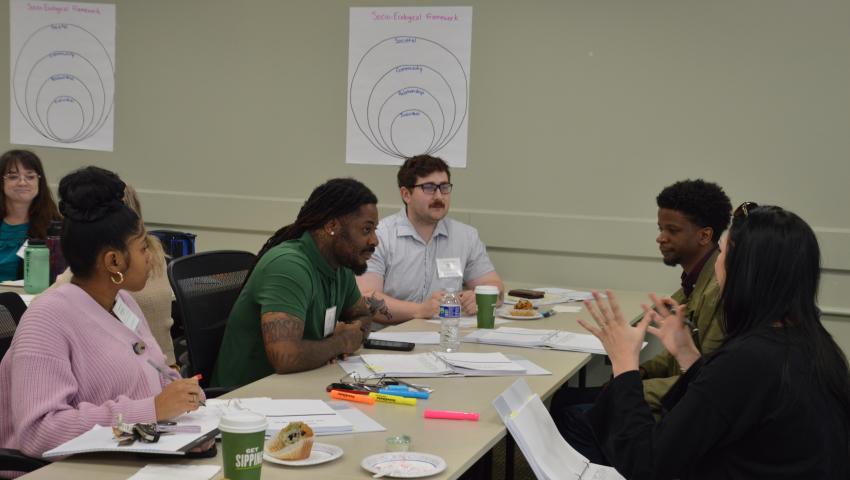
Kentucky Launches Injury-Free Academy
The Kentucky Injury Prevention and Research Center (KIPRC), part of the University of Kentucky College of Public Health, has launched the Kentucky Injury-Free Academy (KIFA), a new initiative designed to support local teams in developing and strengthening community-based violence prevention strategies.
The first KIFA session took place May 22-23, 2025, in Frankfort, with multi-disciplinary teams representing communities across the state, including Louisville, Hardin County, Nelson County, Franklin County, Fort Knox, and others. Participants included professionals from public health, education, law enforcement, military, and social services, all working together to better address the root causes of violence.
“This was an excellent opportunity for teams to work together with partners from their region,” said Catherine Hines, program manager of KIFA. “They were incredibly engaged and supportive of each other.”
KIFA is based on the long-standing Injury-Free North Carolina Academy and is among the first efforts to pilot this model outside the state. It uses a Shared Risk and Protective Factors (SRPF) framework, which encourages violence prevention by strengthening protective community conditions such as connectedness and economic opportunity.
“The framework provided by University of North Carolina has been incredible for our communities to experience,” Hines said. The Kentucky Injury-Free Academy builds on the successful model of the Injury-Free NC Academy, launched at the University of North Carolina in 2012.
Each team was required to apply and consist of representatives from multiple sectors within a region. Once selected, teams were matched with a dedicated coach who helps guide them through the academy, and link them to resources and subject matter experts as well as facilitates group activities.
“By having coaching support, the teams are able to utilize the resources and information to implement and enhance the incorporation of shared risk and protective factors into their community-based violence prevention programs,” Hines explained.
The Academy consists of two in-person sessions and one virtual session. The next in-person session will take place in Frankfort on July 28–29. The final session will be held virtually on Sept. 3.
During the in-person sessions, teams engage in interactive workshops, team-building exercises, and strategy planning based on SRPF concepts. At the first meeting in May, teams introduced their existing violence prevention work, shared goals, and began shaping action plans. As KIFA continues through the summer and fall, the participating teams will refine their strategies, share challenges and successes, and present their work at the final session in September.
For Amy Stahley, Safe Communities Specialist with the Lincoln Trail District Health Department and a member of the Hardin County KIFA Team, the Academy is a chance to align her ideas across her region’s six counties.
“Our team is made up of a lot of dreamers,” said Stahley. “I think we’re really hoping to bring all of that in and give us the skills and resources to be really impactful in our community.”
Stahley said her team came to the Academy hoping to collaborate and avoid “reinventing the wheel” by learning from experts and peer organizations around the state.
“I really wanted to come somewhere where we could collaborate and talk to people that have already done something in their communities,” she said.
Many teams were unfamiliar with the SRFP framework.
“Overall, they were pleased with the materials,” Hines said. “For some, it was a new framework...but for those who were already familiar, working through concepts in a dedicated space sparked creativity and implementation plans.”
"The range of experiences and deep institutional knowledge across our teams creates a rich environment for mutual learning. In my roles as a coach, subject matter expert, and organizer, I’ve gained valuable insights from both my own team and others" Jacqueline Seals, DrPH, Co-Investigator of KIFA.
The final Academy session will include a showcase of team projects, and participating organizations will be invited to continue engaging through alumni support opportunities and future technical assistance. Hines said long-term success means not just developing new ideas, but seeing teams apply what they’ve learned back home.
“We want to see teams utilizing this framework and impacting their communities in innovative and impactful ways,” she said. “We also want to see teams find support from each other. Opportunities to share barriers and facilitators when working in this space is essential and allows these teams to serve their communities in an even more effective way.”
KIPRC hopes the Academy can continue with sustainable funding and serve as a long-term support model for violence prevention in Kentucky communities.
KIPRC is a unique partnership between the Kentucky Department for Public Health (DPH) and the University of Kentucky’s College of Public Health. KIPRC serves both as an academic injury prevention research center and as the DPH’s designee or “bona fide agent” for statewide injury prevention and control.
This resource was developed using funds made available from Safe States through a cooperative agreement with the Centers for Disease Control and Prevention (Creating Safer States by Advancing Health Equity, Injury, and Violence Prevention), Award # 1 NU49CE000001-02, CFDA 93.136). The views expressed in written materials or publications do not necessarily reflect the official policies of Safe States or CDC, nor does the mention of trade names, commercial practices, or organizations imply endorsement by Safe States or the U.S. Government.